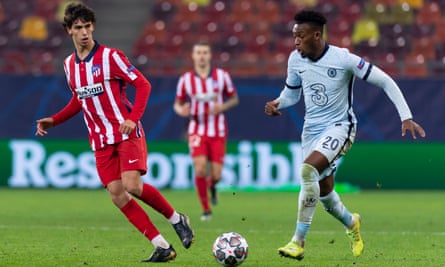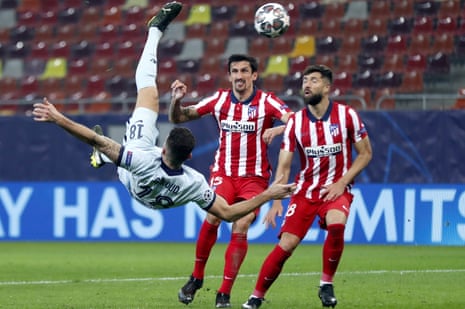Olivier Giroud is 6ft 4in tall, weighs 14½ stone and is 34 years old. This Champions League last-16 first leg was his 574th game in 16 years as a professional footballer. Even in his late-20s pomp Giroud was always a heavy piece of equipment, an ambling, handsome upended sofa-bed of a centre-forward, not so much bullish as bovine, with a slightly bashful sense of craft.
Even as a World Cup winner Giroud has always had that likable air of the outsider, the Ligue 2 arriviste still just chasing the next step, the next break. With 68 minutes gone at the Arena Nationala, on a night of tight, fine-detail football, Giroud found himself in another strange and surprising position.
There he was, upside down, rotating, head six inches above the Bucharest turf, feet stretching up, left ankle cocked, staring back in snapshot at the Atlético Madrid goal as the ball floated down out of the night sky.
Giroud had not planned to be upside down. It happened in an instant, with a startlingly sudden complete rotation of his 34-year-old body, an instant response to the arc of the ball as it skewed up in a slow, deceptive parabola from the toe of an Atlético defender. Nobody else reacted. Only Giroud rotated, astronaut-style, manufacturing out of that anti-gravity flip a moment of wonderfully sweet connection.
This wasn’t just a stunning overhead kick. It was a piece of pragmatism. Giroud had no other way to generate enough power to score. That left leg uncurled itself, guided by the spatial memory passed up from brain to foot. The connection was perfect, struck down and into the corner away from the right hand of the best goalkeeper in the world, Jan Oblak.
So yeah, that was nice. Is it time, you wonder at moments like these, to accept that Giroud is simply an outstanding centre-forward. He can’t run very quickly. He looks diffident. He doesn’t have a stack of romping 30-goal seasons behind him. He always seems, somehow, to be filling in gamely.
And yet here the was all the same, suspended in the air above the turf, crumpling now into a heap of Giroud, before springing up in time to agonise over the predictably irritating VAR check.

This was Giroud’s sixth Champions League goal of the season, albeit four of those came in one game against Sevilla. More importantly it crowned a wonderful result for Chelsea, and a hugely convincing performance against the best team in La Liga and one of the modern giants of this competition.
Giroud will take the headlines for that moment, and for a fine performance. But Thomas Tuchel deserves credit too, not just for the selection of his centre-forward, but for the way his team played, its fearlessness against traditionally powerful opponents. His other notable call here was the selection of Callum Hudson-Odoi from the start, rewarded with a fine, hugely committed performance, and perhaps a corner turned in Tuchel’s own early days at the club.
The manager had been aggressively up front about his reasons for dragging Hudson-Odoi back off at the weekend, breaching one of the great professional taboos. Listening to the hushed and horrified tone in the TV punditry studio without knowing the detail you could have been forgiven assuming Tuchel had marched Hudson-Odoi around the Chelsea car park in headlock, or insisted he play the final 20 minutes in pants and socks.
Here that mini-psychodrama was given a thrilling nudge by Hudson‑Odoi’s unexpected inclusion from the start against one of the great Champions League teams. At times in the first half Atlético did produce those passages where they suddenly press viciously in every position, a throb of shared energy passing through the red and white shirts as though subject to some hive-mind internal signalling. Otherwise they were disappointing, unable to respond as Chelsea went toe to toe and finally reeled them in.
Mason Mount was booked in the first minute, but just kept on going, producing another fine, commanding performance.
Hudson-Odoi, who is not a full-back, who grew up as a striker, who has perhaps never played a competitive game there, played at times as a right-back up against Thomas Lemar and looked eager, aggressive and dangerous going forward
For long periods the interchange between Hudson-Odoi and Mount on the right was Chelsea’s best inroad, the closest thing to a source of actual incision. The high speed double one-two between the pair just before half-time was a lovely little off-the-cuff move to force a corner. And steadily Chelsea began to dominate in central midfield, and to draw the sting from a team that really doesn’t lose very often in this competition.
Here though, they were quelled by a compact and relentlessly aggressive Chelsea team, the night given a gloss by Giroud’s moment of brilliance.
It felt like a fitting end to the first act of the Tuchel era at Stamford Bridge: a sifting of parts, a tightening of the edges, and a result here that might just be Chelsea’s best in this competition since they won it.

Comments (…)
Sign in or create your Guardian account to join the discussion